The Guardian
Link
The president of Aleppo city council, Brita Haji Hasan, had a picture on his phone. It showed the corpse of Hasan Amory, 29, a father of two and council engineer who that morning had been killed by a Syrian air force missile as he headed into work in the opposition stronghold.
“We have had massacres on a daily basis for six or seven days,” Haji Hasan told the Observer, during an interview in the Turkish city of Gaziantep, 30 miles from the Syrian border.
“They are destroying schools and civilian targets using barrel bombs, airstrikes and machine guns. Another colleague of mine was killed yesterday while I spoke to him on Skype.”
As the most senior civic leader in Aleppo, Haji Hasan has been trying to make life livable in the most impossible and dangerous of circumstances. “It is a terrible situation,” he said. “But we are trying to live.”
Syria’s largest city is once again under bombardment: its residents are, once again, exposed to pitiless, wanton attack as the world looks on. The ferocity and cruelty of the bombing of Aleppo by Bashar al-Assad’s air force has shocked even those familiar with the worst of this conflict.
Since breaking its ceasefire eight days ago, the regime has launched more than 260 airstrikes, 110 artillery strikes and 18 missiles, and has dropped 68 bombs, according to the civil defence organisation in opposition-controlled Syriaknown as the White Helmets.
Aleppo has been excluded from a partial ceasefire agreed elsewhere in the country late on Friday evening. On Saturday the regime’s airstrikes began at around 10am with a volley of seven missiles hitting civilian areas in the space of half an hour, killing at least six people and injuring 20. That came after attacks on Friday left at least eight people dead and destroyed a medical facility and a water pump, threatening the city’s vital supplies, according to reports.
On Thursday, bombs destroyed a hospital backed by Médecins Sans Frontières and the International Committee of the Red Cross, killing the city’s last remaining paediatrician, along with 26 other people, including three children.
Staffan de Mistura, the UN envoy for Syria, declared the cessation of hostilities agreement brokered by the US and Russia as “barely alive”as a result.
The UK’s special representative for Syria, Gareth Bayley, tweeted: “#Russia needs to get control over the #Assad regime’s attacks on civilians.”
US secretary of state John Kerry meanwhile urged a return to the nationwide ceasefire in Syria and said attacks on Aleppo must stop immediately.
“The secretary expressed his deep concern about the deteriorating situation in Aleppo, where the ... regime (of President Bashar al-Assad) continues to escalate the conflict by predominantly targeting innocent civilians and parties to the cessation of hostilities,” his spokesman John Kirby said.
Kirby said work was taking place to defuse tensions and the hope was that “tangible progress” would be made soon.
Such is the onslaught that the Observer understands humanitarian organisations are considering pulling out of Syria’s biggest city. A draft statement being circulated among NGOs warns of a “complete absence of the fundamentals of safe humanitarian intervention, and the absence of a clear mechanism to monitor and document violations of international humanitarian law and human rights law”.
It further claims that there is “growing, recurrent targeting of humanitarian organisations, teams, and the vital centres that provide services to civilians in the province, by the Syrian regime and its allies”.
It goes on: “The most recent assaults included the shelling of Syrian civil defence centres, al-Quds children’s hospital, NGOs’ ambulance systems, and a number of administrative offices of the NGOs operating in the province.”
The UN high commissioner for human rights, Prince Zeid Ra’ad Al Hussein, on Saturday condemned the “monstrous disregard for civilian lives” by all parties to the conflict and called for urgent de-escalation.
The Syrian Observatory for Human Rights, a British-based monitoring group, puts the civilian death toll in government and rebel bombardments of districts in Aleppo since 22 April at nearly 250.
This figure includes around 140 people killed by government-aligned forces in airstrikes and shellings of rebel-held areas, 19 of them children, it said. Insurgent shelling of government-held areas was said to have killed 96 people, including 21 children, according to a report from Reuters.
Al Hussein also made reference to widespread rumours that new Russian artillery sites were being established on the outskirts of Aleppo. “The violence is soaring back to the levels we saw prior to the cessation of hostilities,” he said. “There are deeply disturbing reports of military build-ups indicating preparations for a lethal escalation.”
In his interview with the Observer, Haji Hasan confirmed that Aleppo was under partial siege, and that the last remaining road had been under almost constant attack since the two-month ceasefire between opposition and regime forces was broken by Assad. He said that he had heard about the Russian build-up on the periphery of the city but that he could not confirm this presence.
“In 2013 there were two million people in and around the city,” he said. “There are 400,000 right now. Some people just fled, but these 400,000 won’t leave – even though they know that at any time they could be bombed or killed. It is semi-siege right now. The only road connecting Aleppo is always targeted by airstrikes, the Castello road. This road is targeted by airstrikes and snipers, too. It is a dangerous road, but we have to use it, there is no other. If that goes, we will be besieged. It will be a disaster.”
Late last week, in another illustration of just how dangerously fraught the politics of the city are becoming, Haji Hasan was seized by Kurdish secret police at his home at 9am on Thursday after having made the 10-hour trip back through the badlands of northern Syria.
He was subsequently detained in the police station before being taken to the Kurdish city of Afrin, in north-west Syria. His whereabouts on Saturday were unknown.
Sources close to Haji Hasan, who has sought to build a consensual council for the crisis-stricken city, said it was unclear why the Kurdish forces would interfere in the civilian government. The vice-president of Aleppo’s city council, Zacharia Amino, condemned Haji Hasan’s detention as a violation of human rights. The father of eight, who had been keeping services running in the city, had been taken from the citizens when they needed him most, said friends. A statement on Saturday said: “We firmly condemn this violation and we demand the democratic council to release immediately the president of the local council of the city of Aleppo and to explain this precedent and to offer official excuses.”
A temporary “regime of calm” announced by the Syrian army late on Friday appeared to have taken hold in two other areas blighted by recent fighting: in the north-western coastal province of Latakia and on the outskirts of the capital,Damascus. The Syrian government said the “regime of calm” – from which a military source said Aleppo was excluded – was an attempt to salvage a widerceasefire deal reached in February.
Aleppo has been divided for years between rebel and government zones. Full control would be the most important prize for Assad. He claims the fighters in the city are al-Qaida extremists.
The UN has called on Moscow and Washington to help restore a comprehensive ceasefire to prevent a collapse of talks aimed at ending a conflict in which more than 250,000 people have been killed and millions displaced. In Aleppo they will not be holding their breath.

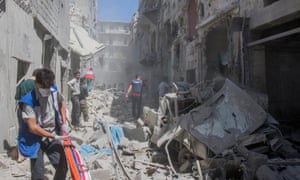
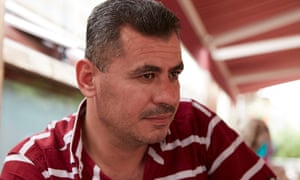
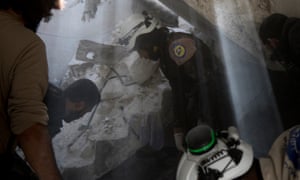
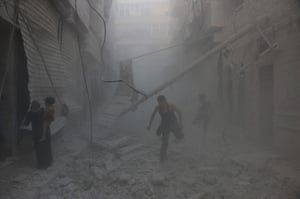
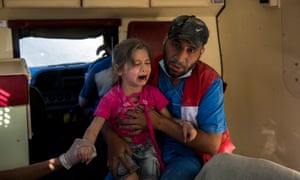
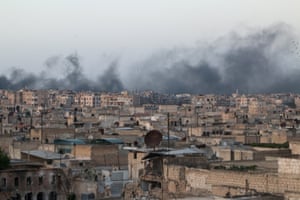
No comments:
Post a Comment